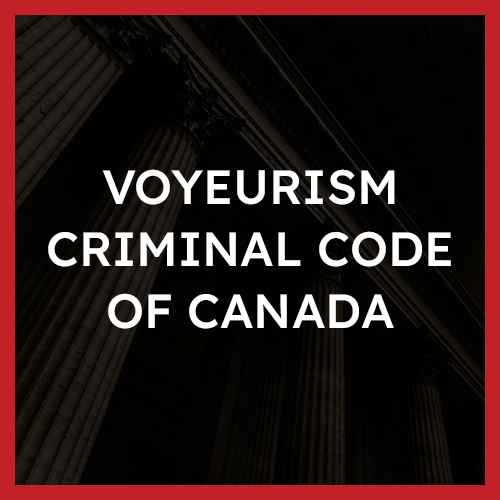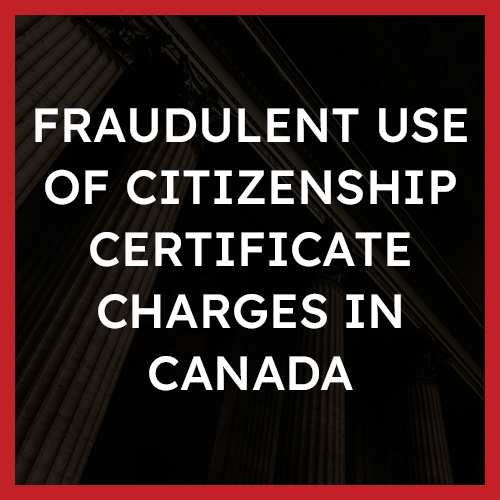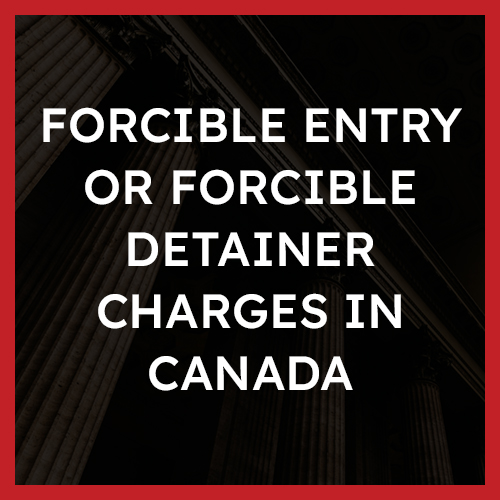Voyeurism (s. 162 (1)) Criminal Code of Canada: Offences, Defences, Punishments
Voyeurism Charge
Section 162 of the Criminal Code outlines the criminal charges pertaining to voyeurism. This section specifically prohibits the non-consensual, surreptitious viewing, photographing, or filming of another individual who has a reasonable expectation of privacy.
What is Voyeurism in the Criminal Code of Canada?
 Voyeurism is covered under s. 162(1) of the Criminal Code of Canada (the “Code”).
Voyeurism is covered under s. 162(1) of the Criminal Code of Canada (the “Code”).
It is a relatively new offence in Canadian law, added to the Code in 2005. Voyeurism involves making secretive observations of individuals who are nude, performing sexual acts or in the process of doing so.
The offence is intended to protect people from both sexual exploitation and infringements on their personal privacy.
With the increasing prevalence of smartphones with high-quality cameras and quick-access photography apps, allegations of this offence have increased dramatically. Since the offence was added to the Code, incidents have increased from 1 in 2005 to 959 in 2005.
Voyeurism Overview Video
Voyeurism Examples
This offence covers activity from a Peeping Tom in the bushes all the way to a sophisticated webcam hack.
Some of the most common examples in Canada include:
- Secretly taking pictures of or recording a roommate in their bedroom;
- Using a “peephole” to watch someone changing or bathing in a private room; and
- Installing a hidden camera in a public restroom to record its users.
Voyeurism Defences
Every case is different. Defences that may be available in one case may not be available in another. The strength of any defence rests on the evidence against you and the precise details of the allegations.
Generally, defences to voyeurism include showing a lack of mens rea or actus reus (meaning the mental and physical elements of the offence are not made out) and Charter arguments which point to a specific part of the investigation where your constitutional rights (such as your right to be free from unlawful search and seizure) may have been violated.
Voyeurism Punishment
Voyeurism is a hybrid offence, meaning that the Crown can elect to proceed by way of indictment or summary offence. This choice will impact the severity of punishments that you are given, with indictment being the more severe of the two.
Your chances of receiving a jail sentence for a voyeurism conviction are low.
Although voyeurism has no mandatory minimum penalties, the Code does list the maximum punishments as follows:
- Indictment: Up to 5 years imprisonment.
- Summary: Up to 2 years less a day imprisonment and a $5,000 fine.
Voyeurism Laws in Canada Infographic
Overview of the Offence
Voyeurism is covered under s. 162(1) of the Criminal Code of Canada:
162 (1) Every one commits an offence who, surreptitiously, observes — including by mechanical or electronic means — or makes a visual recording of a person who is in circumstances that give rise to a reasonable expectation of privacy, if
(a) the person is in a place in which a person can reasonably be expected to be nude, to expose his or her genital organs or anal region or her breasts, or to be engaged in explicit sexual activity;
(b) the person is nude, is exposing his or her genital organs or anal region or her breasts, or is engaged in explicit sexual activity, and the observation or recording is done for the purpose of observing or recording a person in such a state or engaged in such an activity; or
(c) the observation or recording is done for a sexual purpose.
It is critical to remember that in Canada it is your constitutionally protected right to be presumed innocent until proven guilty. This means that the Crown must prove all elements of the offence beyond a reasonable doubt for you to be convicted. If doubt can be raised that you did not complete the physical or mental components of the offence (as described below) the Crown will not be able to secure a conviction against you.
The Guilt Act (Actus Reus)
The actus reus for voyeurism requires that to be found guilty, the Crown must prove beyond a reasonable doubt that:
- You surreptitiously observed or recorded a person; and
- They had a reasonable expectation of privacy in that setting.
To do something surreptitiously means doing something in a secretive manner intended to avoid being noticed.
Regarding a reasonable expectation of privacy, a recent decision by the Supreme Court of Canada in R v Jarvis, 2019 SCC 10 noted that people have a reasonable expectation of privacy in an area, location or circumstance if the person does not expect to be secretly recorded or observed.
Furthermore, to determine whether a location gives rise to a reasonable expectation of privacy, the court must consider the entire context of the alleged voyeurism including considerations such as: the location of the person when they were observed or recorded, how the recording or observing was done and the relationship between the accused and the complainant.
The Guilty Mind (Mens Rea)
In addition to the actus reus, the Crown must also prove beyond a reasonable doubt the mental elements of the offence including:
- You committed the offence for the purpose of observing/recording a person who is nude/expected to be nude; or
- You were doing so for a sexual purpose.
For example, if you were recording or observed a person in a setting that would be considered to have a reasonable expectation of privacy but did not expect the individual to be nude and you did not do it for a sexual purpose, then the necessary elements of the offence have not been made out and the Crown will not be able to proceed.
Voyeurism Defences
How to Beat a Voyeurism Charge
As previously mentioned, every case is different. There is no single defence that can be applied to every allegation of voyeurism. That said, there are numerous defences available that when used effectively can significantly and positively affect the outcome of a case.
In general, the best defences are:
Factual Innocence
This is usually the strongest defence because the facts and the evidence do not support you being there and observing or recording, or other basic elements of the offence. One example is:
Identity
In some circumstances where the offence was not recorded by surveillance footage, or the footage is poor quality, you may be able to raise an identity defence. For example, authorities could have made a mistake in identifying you as the perpetrator based on the poor quality of the footage. In order to effectively raise this defence, you may need corroborative evidence, such as an alibi to show where you were at the time of the offence.
No Mens Rea/Actus Reus
If you can successfully challenge the mental or physical elements of voyeurism, you cannot be convicted. For example, if there was no reasonable expectation of privacy, this would challenge the physical element of the offence.
Violation of Constitutional Rights
The Canadian Charter of Rights and Freedoms(the “Charter”) sets out your rights before and after your arrest. If the police fail to abide by these rights, it could aid in your defence.
While the Crown must prove the elements of the offence beyond a reasonable doubt, you bear the responsibility of raising certain defences at trial. The burden of proof remains high for this kind of prosecution. This means that there are many successful defence strategies that our experienced defence lawyers can employ, depending on the circumstances of your case.
Our lawyers have significant experience assessing the availability and strengths of various potential defences in voyeurism cases, as well as presenting any and all available defences to the court at trial. Even if you believe that you will be found guilty, it is important that you obtain a legal opinion about defences that may be available to you.
Voyeurism Punishment
As mentioned, although your chances of receiving a jail sentence on a voyeurism charge are low, it is not impossible.
The Code does not provide minimum punishments for this offence, however, they do advise on maximum penalties as follows:
- Indictment: Up to 5 years’ imprisonment.
- Summary: Up to 2 years’ less a day imprisonment and a $5,000 fine.
When assessing punishments for this offence, the court will consider:
- Attempts to dispose or conceal evidence,
- Attempts to stop the victim from reporting the offence,
- Previous convictions of a similar nature,
- The age of the victim,
- The location of the offence, including the expectation of privacy,
- The planning and deliberation that went into the execution of the offence,
- The use of violence, or threats of violence,
- Whether events were recorded,
- Whether images/videos were distributed,
- Whether the offence was committed while you were out on bail, and
- Whether you were in a relationship of trust.
In addition to the immediate penalties resulting from a conviction for voyeurism, it can have wide-ranging negative consequences on your future. You may have trouble securing employment, especially in roles that require working with children, the elderly, or other vulnerable sectors of society. The lifelong criminal record that results from a conviction can hinder immigration and travel. Finally, because of the nature of voyeurism charges, your friends and family may perceive you as unworthy of their trust, and it can heavily impact your reputation.
Therefore, even if you intend on accepting responsibility for this type of offence, it is worthwhile to explore your options and consider all the possible penalties. Often, good representation can result in no criminal record. Furthermore, a community-based sentence may be obtained even when the Crown is seeking jail time.
Rest assured, our lawyers will work hard to defend you so that you are not saddled with the consequences that stem from a criminal conviction for voyeurism. In fact, we can canvass a range of sentencing options with the Crown that will either leave you with no criminal record or impose minimal restrictions on your liberty after sentencing. To learn more about potential non-criminal resolutions, please visit our Resolutions page, or read our FAQ on resolutions and other sentencing options.
Frequently Asked Questions
Can you go to jail for voyeurism in Canada?
It is possible to go to jail for voyeurism in Canada, although uncommon. Whether you serve a period of incarceration will depend on several factors including:
- The severity of the offence,
- Your relationship with the complainant,
- If you have a previous criminal record or similar convictions in the past,
- The safety of the community and complainant,
- Your risk of re-offending.
Rest assured with one of our experienced defence lawyers on your side, we will do everything we can to persuade the judge not to issue a custodial sentence.
Is voyeurism a serious offence in Canada?
Voyeurism is considered a serious offence in Canada. It is found in the Code under Part V which includes sexual offences, public moral offences, and disorderly conduct. The offence is considered serious because it violates an individuals Charter protected right to privacy.
Victims of voyeurism often experience long-lasting effects that impact their lives for years to come. For this reason, judges, Crown Prosecutors and peace officers alike take this offence seriously and will not hesitate to investigate and lay charges should they believe you have been involved in any kind of voyeuristic behaviour.
What is the definition of voyeurism?
In plain language, is the act of an individual who secretly observes or makes a recording of a person who is nude or performing a sexual act and that person had a reasonable expectation of privacy at that time.
Voyeurism is defined under section 162(1) of the Code:
162 (1) Every one commits an offence who, surreptitiously, observes — including by mechanical or electronic means — or makes a visual recording of a person who is in circumstances that give rise to a reasonable expectation of privacy, if
(a) the person is in a place in which a person can reasonably be expected to be nude, to expose his or her genital organs or anal region or her breasts, or to be engaged in explicit sexual activity;
(b) the person is nude, is exposing his or her genital organs or anal region or her breasts, or is engaged in explicit sexual activity, and the observation or recording is done for the purpose of observing or recording a person in such a state or engaged in such an activity; or
(c) the observation or recording is done for a sexual purpose.
Published Decisions
R v Jarvis, 2019 SCC 10
The accused in this case was convicted of voyeurism whereby he was recording his students with a hidden camera on his pen. The main consideration in this case was whether the students could have reasonably expected privacy in the common areas of their school. The Supreme Court agreed that the students should reasonably expect not to be recorded by a teacher’s hidden camera. In particular, the majority was clear that although technology may make it easier to violate someone’s privacy, does not mean a person should have to accept that.
You can read the full decision here.
R v Trinchi, 2019 ONCA 356
The accused appealed his conviction of voyeurism after he had been found taking screenshots of his long-distance partner while she willingly appeared naked in their video chats. The complainant did not know these screenshots were being captured nor did they consent. Although the accused argued that the complainant could not have a reasonable expectation of privacy as they willingly appeared naked, the Court of Appeal dismissed the appeal stating that the complainant did not know or expect the accused to make a permanent recording of her naked body.
You can read the full decision here.
R v Dastagir, 2018 MBPC 44
The accused was charged with voyeurism after it was discovered he had been watching the basement tenants of his house via a hole between the laundry room and bathroom. The hole allowed him to see the toilet and shower. The court provided a detailed discussion of the various sentences available for voyeurism charges, noting that although a community-based sentence is often acceptable, custodial sentences can still be warranted if the behaviour is particularly egregious.
You can read the full decision here.
About The Author
Ask A Question
We endeavor to respond to questions within 24 hours. If your matter is urgent, please call our office or submit a request for a free consultation.








